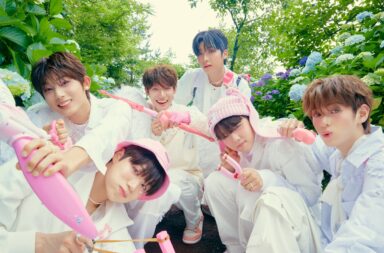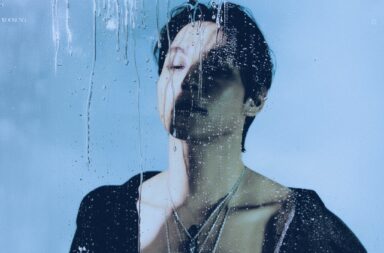The ladies of Mamamoo return to the spotlight with their sixth mini-album, Yellow Flower. The vocal powerhouse has steadily been releasing music for the past few years. While this release does buck their trend of one winter and one summer album, the title itself is apt for the season. It manages to highlight both the wistfulness of spring while signifying a period of growth for the quartet.
Yellow Flower opens surprisingly, if not a bit unexpectedly. I’ll always contend that it’s a bold choice to begin an album with a ballad, especially one that doesn’t really build to a large showstopper. But if there’s one group that can pull it off, and with a great deal of style, it’s Mamamoo. “Star Wind Flower Sun” has a heartache to it that sustains throughout its three minutes and forty-three seconds. Each performance is poignant, bolstered by the simplicity of the piano and string synth.
From there we get the album’s second single, “Starry Night” It rides a steady composition steeped in Flamenco-pop, which inherently makes it less of a dance track and more a song to highlight the musical growth of the group and, of course, support their stellar vocals. This lover’s lament is set up as a paradox: the passion and fire of the Flamenco-inspired composition with lyrics that wax poetic about the residue left over from a failed relationship. The juxtaposition is interesting, at the very least seeming to showcase that even after the pain of a breakup our protagonist still has it within her to carry a flame, a spark that allows her to live her life even when her lover has left her cold and alone.
From an emotional jumble of sorrow and fierce determination, we get the album’s lone solo track. “Be Calm” seems to be Hwasa‘s response to the emotional tumult of “Starry Night.” She implores her friends, and indeed herself, to remain calm despite any lingering heartache. While Hwasa certainly has the power to carry an R&B-laced acoustic track, tonally there are moments when her voice works against the composition instead of in concert with it. She errs on the side of breathy when expressing a deeper level of emotion. That being said, as a solo track, it mostly compliments her range and pushes her as a stronger force in the group. Though in terms of the vocal dexterity to really sell the song’s emotional weight, Solar’s range and depth would’ve proven a truer fit.
Following Hwasa’s own turn with R&B, the women regroup to bring us a decidedly more straightforward midtempo dance track. The ladies regale listeners with the tales and exploits of their respective significant others. The composition sticks closely to current R&B trends, being at once edgier than most bubblegum pop and on the poppier side of the heavier genre. It works as a typical bit of sass from the group, nothing more or less.
Of course, what would a Mamamoo album be without a track to explore the breadth of their vocal prowess? Their harmonies are more on display, and their ability to exist as a powerful unit is never more apparent than in “Spring Fever.” Each vocal is tighter, more expressive. Moon Byul even delivers a rap that both compliments and bolsters the song, a rare feat for much of the rapper aspect of idol groups. This is the rare occasion when the girls allow the song to simply be. Taking hints from the single guitar, the group capitalizes on the quiet spaces in the song, allowing them to breathe, not going for too much and simply coexisting with the song rather than attempting to overpower it with larger-than-life vocals.
This, of course, makes the final track, the album’s lead single, all the more grandiose. From first note, it’s clear this is going to be one of those sweeping tracks that completely brings the album to its knees. Indeed, “Paint Me” is a show-stopping stunner meant to feature each vocalist’s range and ability. The musical composition itself is simple: a piano, brushes against a cymbal, and light strings. “Paint Me” is atmospheric, a cinematic track that’s all drama and elevated moments of passion. Of the songs on the album, this is the truest to form, both vocal and instrumentation quite literally painting an aural landscape: the ladies atop a hill or breaching a summit to look out at an expanse of endless stars, galaxies spinning and creating a light show in the sky. It’s a beautiful track, one that most assuredly cements Mamamoo as one of K-pop’s most prized vocal treasures.
It goes without saying that Mamamoo is one of the most vocally talented groups of young women in K-pop. At this point, what’s more important is the quality of the songs and the question of musical growth. As far as their development as artists, they’ve certainly shown they can tackle subject matter that may be at its core rather controversial, or at least more mature, with some alacrity. Musically, they’ve gone much in the direction of their former seniors SPICA — that is tight melodies centered around less typical K-pop production (bits of jazz, stronger roots in R&B, and the moments of traditional doo-wop they’ve become known for). How successful they are in that shift in direction is questionable. Indeed, they have the vocal chops to handle the more mature musical stylings. I want to reiterate, it’s never a question of talent or vocal ability.
However, there is the question of dimension and range. They go for the power vocals with ease, and at times, as with “Paint Me,” those chops come in handy to deliver some truly magnificent music. But (save for “Spring Fever”) they’ve not mastered the subtlety that goes into pulling off some of the less pop-focused tracks. While their voices are mighty, their need to blow out their listeners with their range means the songs hit one note and stay there. They’ve nothing to prove vocally, so it would serve them to not rely on one member (namely Hwasa) to deliver the softer notes to give them more dimension.
That being said, production-wise this is a glorious piece of music. For those who are more prone to want to hear poppier fair or are looking for something more than a light two-step, this may be a disappointment. But for my money, musically Yellow Flower does a masterful job of at least pushing the group past some of their younger peers and leaving no room for doubt as to their status as one of this generation’s premier idol vocal groups.
(Images via RWB Entertainment, YouTube)


